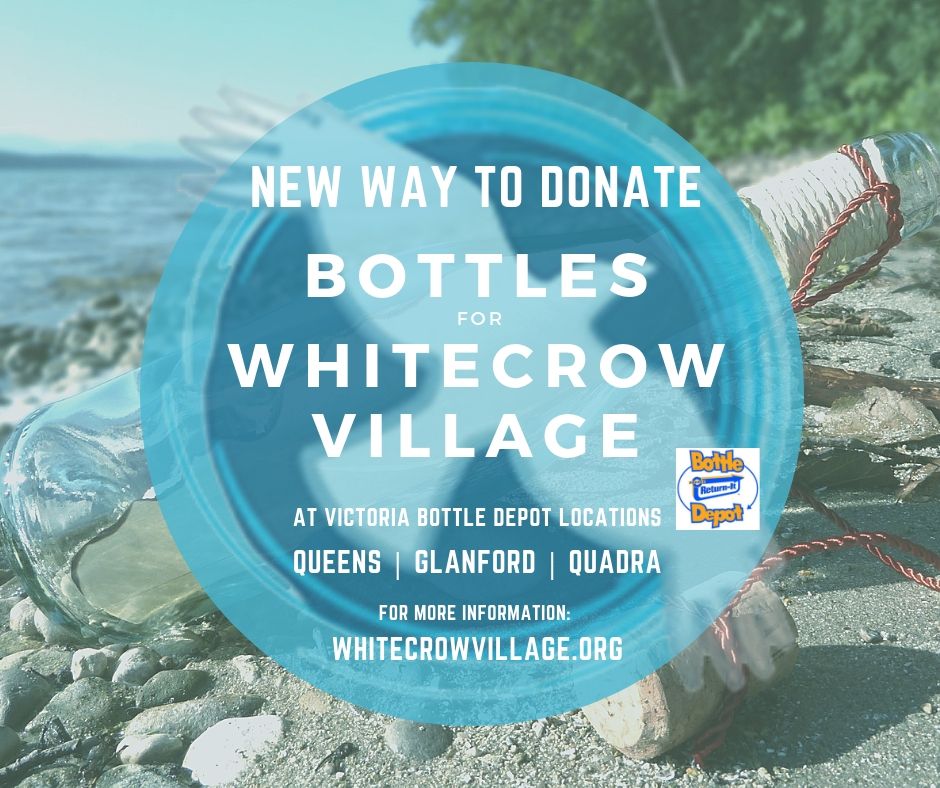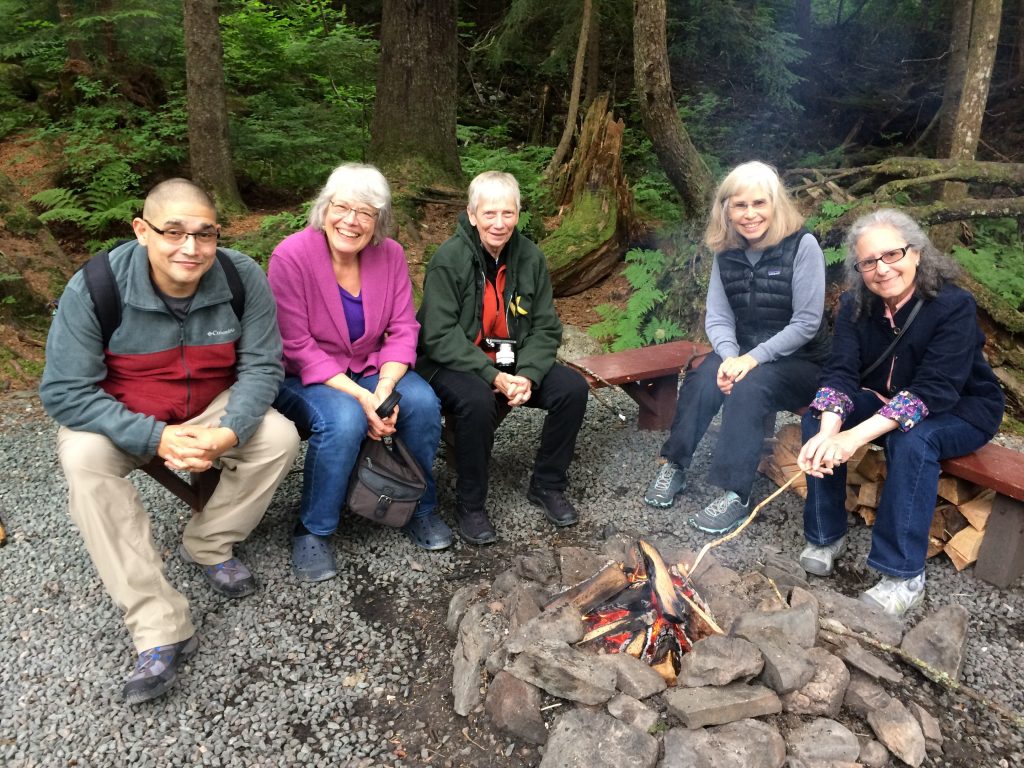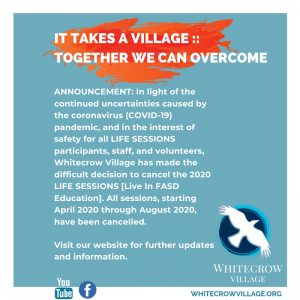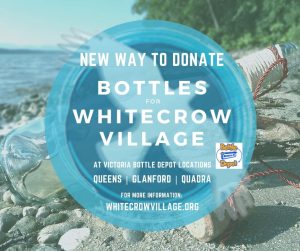BY JACY LA MORISSETTE
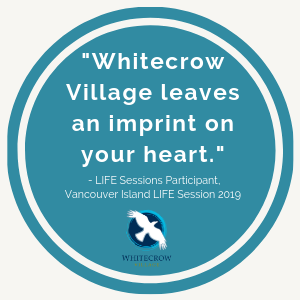
*simplicity* [noun]
sim·plic·I·ty | \sim-ˈpli-sə-tē
:the state of being [simple , uncomplicated, or uncompounded]
:freedom from pretense or guile:[CANDOR]
:directness of expression:[CLARITY)
:restraint in ornamentation:[AUSTERITY]
*Simplicity* is the word that I landed on to describe my first experience of the LIFE Session [Live in FASD Education] held on Vancouver Island this July. Admittedly, one rarely hears the words simplicity and FASD [Fetal Alcohol Spectrum Disorder] in the same sentence – however, Whitecrow Village and its approach is truly like no other.
I joined Whitecrow Village in June of 2019 in the role of Community Relations & Development and while I am no stranger to the world of FASD, having spent several years as a Prevention Facilitator in Central Alberta, I walked away from this six-day family & community experience, transformed (and grateful).
I had always heard good things about the Whitecrow Village LIFE Sessions, mostly while attending the International FASD Conferences held in Vancouver, CANADA – so, I was eager to be involved in some way since my move to Vancouver Island. The July LIFE Session was reportedly smaller in numbers than most – hosting three families (with children ranging from ages 4-15). Our team of staff and volunteers arrived the day before to set up and take care of some of the final details before our guests arrived. Secretly, I was thankful for the smaller numbers for I anticipated that it would offer me the opportunity to have a deeper and fuller experience with the people, the program and the place. I was right.
Deeper Than a Philosophy:: It’s a Practical and Critical Success Factor
Whitecrow Village operates with a combination of team members, some who live with FASD and others who do not. This model is foundational for Whitecrow Village and essential in gaining a comprehensive & experiential 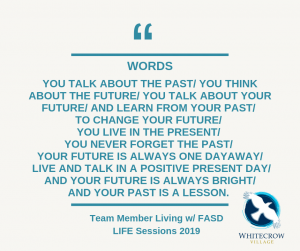 understanding of persons who are affected by FASD. Early on, I had been mentored toward this way of being together – so, it was natural practice for me.
understanding of persons who are affected by FASD. Early on, I had been mentored toward this way of being together – so, it was natural practice for me.
Far beyond providing mentorship and peer support for participants, experiencing the competence of self-advocating adults who live with FASD is inspirational and nonetheless genuine in exposing the vulnerability of adults with FASD. Several team members had participated in LIFE Sessions as youth and were open to sharing their experiences outside of the safety of Whitecrow Village community. Listening to these stories is often sobering and yet provides a depth of understanding beyond what any film, book or lecture can provide.
Visual Chronicle:: Capturing the Creative Spirit
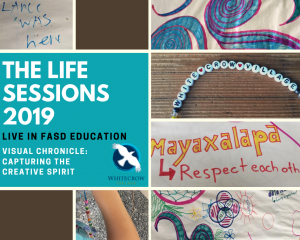 In preparation for our participants, we laid out brown packing paper on a large table just outside the venue along with a large bag full of markers. Over the week, the table held vigil for crafting, beading, deep conversations, song, laughter, tears and quiet escapes – and as it turns out, this ‘scroll’ would also collect the words, doodles and drawings that captured the creative spirit of the Whitecrow Village experience. I marvelled at how something as simple as brown paper on a table and markers could attract, engage and connect an entire group of people.
In preparation for our participants, we laid out brown packing paper on a large table just outside the venue along with a large bag full of markers. Over the week, the table held vigil for crafting, beading, deep conversations, song, laughter, tears and quiet escapes – and as it turns out, this ‘scroll’ would also collect the words, doodles and drawings that captured the creative spirit of the Whitecrow Village experience. I marvelled at how something as simple as brown paper on a table and markers could attract, engage and connect an entire group of people.
Breaking Bread:: Building Connection & Community
Nutrition plays a major role at LIFE Sessions with 3 meals and 3 snacks per day, void of sugar and processed foods. This simple approach serves in many ways by using food as fuel to regulate behaviour and to build relationships. Gathering over meals is one of the most ancient forms of developing commUNITY and belonging. Nourished bodies and relationships pave the way to allow for our most basic human desire to participate, cooperate and belong. I’d been told that we each offer something different in our Whitecrow Village work, and our caterers were no exception, infusing the spirit of joy and welcome into each meal. It warmed my heart to witness one of our youngest participants learn how to roll and eat a burrito with the help of our culinary artists. While there are many critics, popular films and books such as: The Magic Pill and This is Your Brain on Joy (Dr. Earl Henslin) speak to how diet can affect individual behaviour and brain health. I was so impressed personally by the dietary change and its impact, that I continued with this way of eating when I returned home.
Circle:: Capture the Wisdom
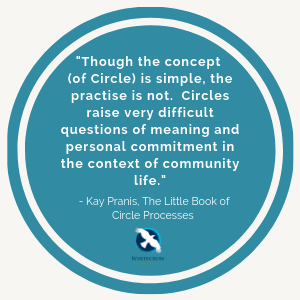 Rooted in Indigenous tradition, I discovered the power of circle a few years ago – though it has been said that we don’t really ‘discover’ circle process so much as remember it. I’ve been hooked on Circle ever since as it creates the space for each of us to speak and listen fully in a simple and gentle way. As equals, each evening we sat in Circle. By sharing our individual stories, we opened places for others; to connect to us, to find common ground with us, to know us more completely and to hear our inner teacher.
Rooted in Indigenous tradition, I discovered the power of circle a few years ago – though it has been said that we don’t really ‘discover’ circle process so much as remember it. I’ve been hooked on Circle ever since as it creates the space for each of us to speak and listen fully in a simple and gentle way. As equals, each evening we sat in Circle. By sharing our individual stories, we opened places for others; to connect to us, to find common ground with us, to know us more completely and to hear our inner teacher.
It was during Circle that I witnessed one of the most beautiful displays of human kindness, that humbled me to tears. It was a gorgeous evening; the sun was signalling its departure and we were sitting in Circle listening to song. It was then that one of our staff experienced a seizure – as the seizure ended and without missing a beat, two of the men in Circle jumped up to guide her to the sleeping quarters to support her recovery. The song didn’t stop, there were no words exchanged and the two men had returned to Circle before the song ended. The nurturing act of the two men conveyed reverence and respect and in a somewhat spontaneous response, we (the Circle) held her compassionately in the silence of the song. It was in that moment that we created connection, trust and community.
Beyond Books:: Learning Together
The model of LIFE Sessions has changed slightly from where it started in response to the needs of children with FASD. In the beginning, families and community members did not attend. Whitecrow Village soon realized that this was a missed opportunity to have family, professionals and community develop a shared understanding of FASD and to carry this education and insight with them at home, work and in community. There were so many learnings, conversations and moments worthy of sharing, however, I wouldn’t be able to do so without writing a mini-novel (or perhaps THE LIFE SESSIONS Part II).
One of the most influential conversations was held on a sandy beach with a couple raising their prenatally exposed nephew. The couple are long-standing members of the Whitecrow family and return to the camp as often as possible. Both parents had a strong desire to have anyone who is serving persons that have been prenatally exposed to participate in a LIFE Session –pointing out that FASD is not a disability that can be understood in theory-land alone; it must be experienced. Dr Jonathon Down, Development Pediatrician, attended a LIFE Session for a week (more than once) – his initial experience was so influential that he attributes it to changing the way he practices medicine! What is more, he now leads our Board of Directors. (I’ll repost the article he wrote about his experience in the next couple of weeks).
If you’re reading this, consider this your invitation to attend a LIFE Session as a volunteer or participate as a family affected by FASD. Oh, and be prepared to change (in a good way).
“In a panacea of programs and services that seem disconnected and often miss the mark on supporting the lifelong needs of persons with FASD, Whitecrow Village is a refreshing anomaly.” – Jacy LA Morissette
For more information about how you can bring a Whitecrow Village L.I.F.E. Session to your community, click here to contact us.
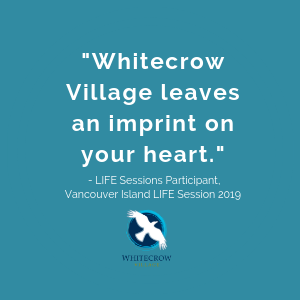
![Whitecrow Village cancels 2020 LIFE Sessions [Live In FASD Education]](https://www.whitecrowvillage.org/wp-content/uploads/2020/04/WV-LIFE-Session-Cancellation-1.png)
